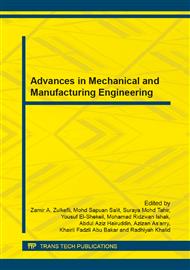p.572
p.577
p.585
p.590
p.597
p.604
p.608
p.614
p.619
Reactive Scheduling of a Decentralized Multi-Objective Material Transportation Tasks in a Dynamic Job Shop Manufacturing System
Abstract:
The increasingly challenging and dynamic nature of manufacturing industry has driven organizations to enhance their system efficiency. One of the most important aspects in manufacturing plant is the Material Transportation System (MTS). In order to address dynamic factors, MTS need to be equipped with rescheduling capability. This paper focuses on reactive transportation task assignment to a fleet of autonomous Automated Guided Vehicles (AGVs). This paper proposes a Mixed Integer Programming method to reschedule transportation tasks for a non-disruptive job shop manufacturing system based on Multi Agent System (MAS) architecture. The result shows that proposed rescheduling method is able to outperform conventional method significantly.
Info:
Periodical:
Pages:
597-603
DOI:
Citation:
Online since:
June 2014
Price:
Сopyright:
© 2014 Trans Tech Publications Ltd. All Rights Reserved
Share:
Citation:


